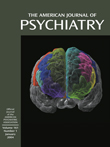An Open-Label Trial of Riluzole in Patients With Treatment-Resistant Major Depression
Abstract
OBJECTIVE: This study was conducted to determine the efficacy and safety of riluzole, a glutamate-modulating agent, in patients with recurrent major depression. METHOD: After a 1-week drug-free period, subjects 18 years or older with a diagnosis of recurrent major depression and a Montgomery-Åsberg Depression Rating Scale score ≥20 received riluzole monotherapy (100–200 mg/day) openly for 6 weeks. RESULTS: Nineteen treatment-resistant depressed patients, 53% of whom were classified as having stage 2 treatment resistance or greater, received riluzole at a mean dose of 169 mg/day. Significant improvement occurred during weeks 3 through 6 for all patients and weeks 2 through 6 for completers. CONCLUSIONS: Although preliminary, these results indicate that riluzole may have antidepressant properties in some patients.



